The Crimewatchers of Greater Manchester
In the Greater Manchester area, a group of anonymous locals are working together to fight crime. Rolling Stone UK meets the Crimewatchers in their small town of Droylsden
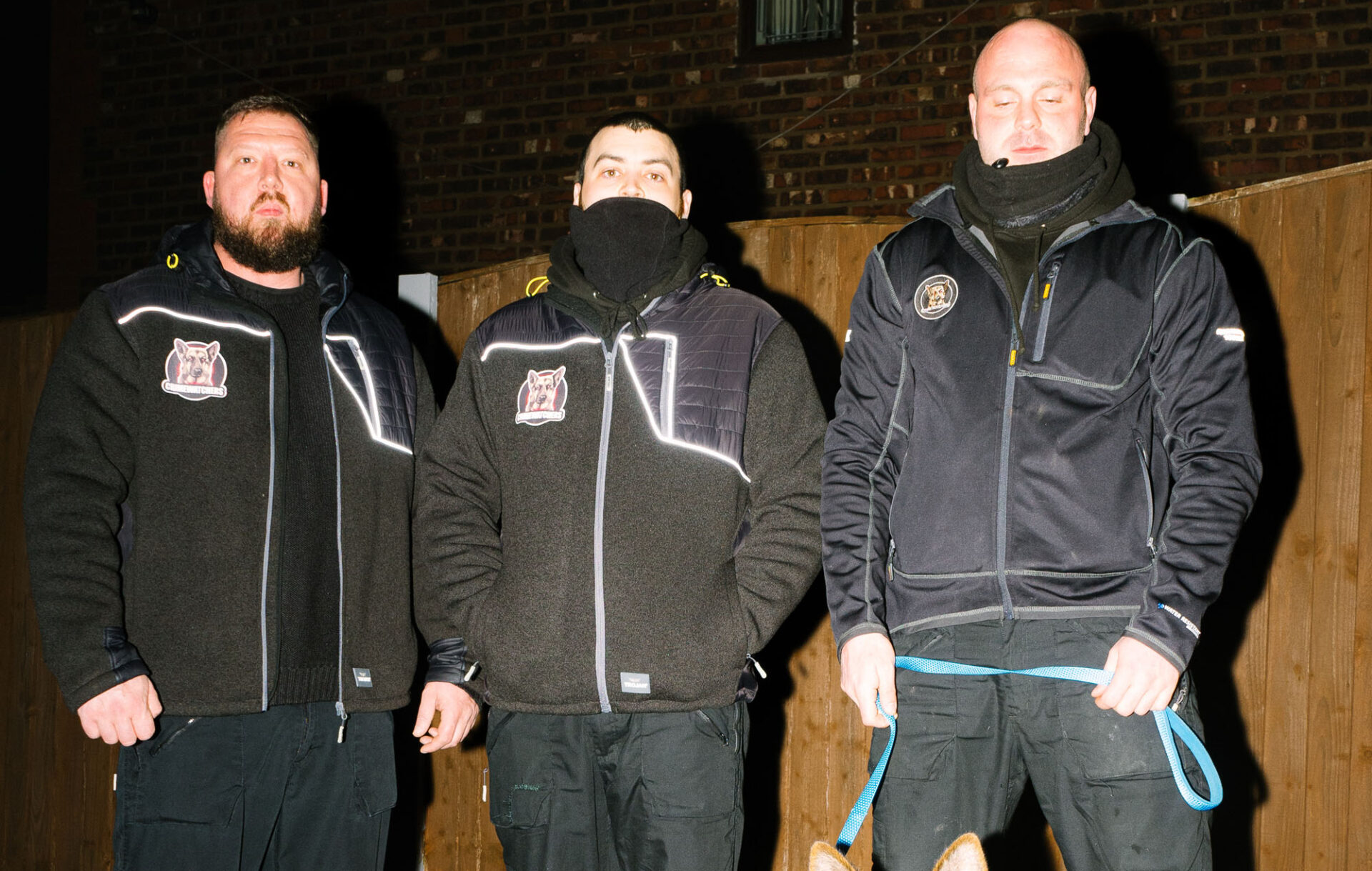
Every crimefighter has an origin story. The Droylsden Crimewatchers didn’t possess mutant genes. Nor did they have an evil supernatural baddie to beat. Their beginnings were understated and almost inconsequential: it all started with a Facebook post.
It was September 2020, and an ex-mechanic in Droylsden — a small town in Tameside, Greater Manchester — had seen somebody breaking into a property on his mum’s street. He had been furloughed from his job at the height of the coronavirus pandemic and had a lot of time to spare, so when the burglar escaped, he decided to take matters into his own hands.
He aired his plans in a local Facebook community group. “Due to all the burglaries going on round here at the moment, tonight between 1—4am, me and a few others will be patrolling the streets keeping a lookout,” he wrote. Within 24 hours, the post had received nearly 1,000 likes.
“It all escalated from there,” he says.
Today, the Droylsden Crimewatchers’ official Facebook page has more than 11,000 followers. They’ve dealt with break-ins, theft, knife crime, anti-social behaviour, suicide prevention and community maintenance. To locals, the Crimewatchers are heroes, and they (along with their Alsatian patrol dog) have become a social media sensation. But what do Greater Manchester Police (GMP) make of them?
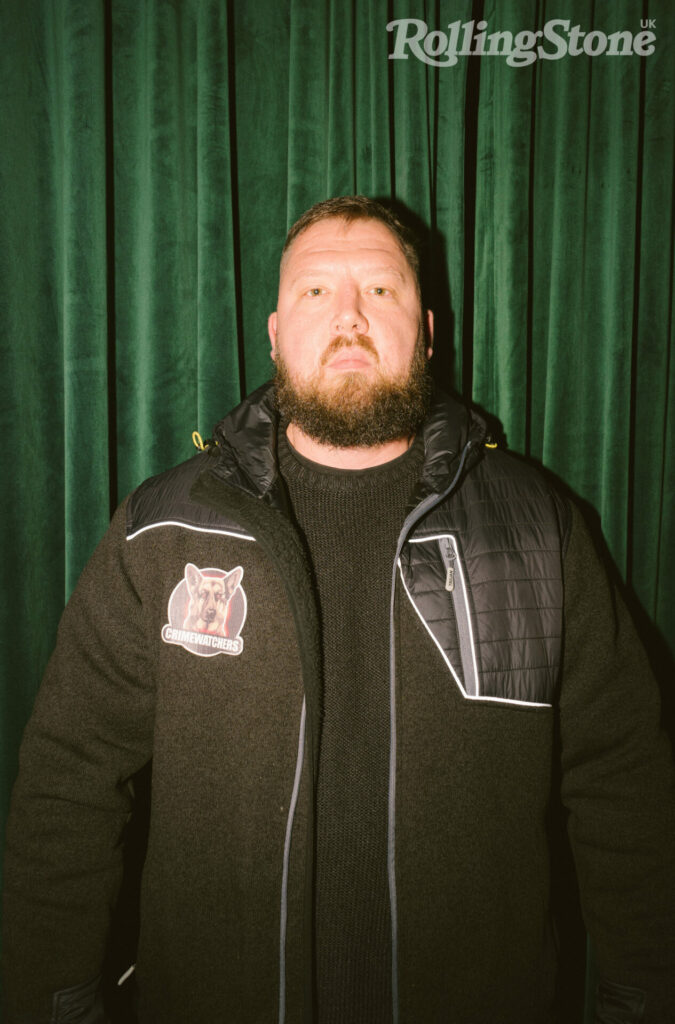
Meeting in a closed cocktail bar in Droylsden on a Saturday morning, the Crimewatchers — who wish to remain anonymous — come across as an approachable bunch of working-class lads with big plans. As well as the ex-mechanic, a bouncer, a roofer and a locksmith are just a few of a posse who were labelled “not to be trusted” by the local police force back in 2021. They represent a large part of an organisation that tackles petty crime at ground level.
Prompted by the Crimewatchers’ initial Facebook post, locals volunteered to join the founder on his nightly patrol. New members undergo a strict vetting process: credit checks, security qualifications and other background searches are carried out to ensure volunteers are legitimate. Just as important is that recruits “fit in with the banter” — the group describe themselves to me as “brothers”, companions who they “wouldn’t think twice about crying in front of”.
When asked why there are no women in Crimewatchers official patrol squad, I’m informed that it’s not because they aren’t allowed, as several females have very recently offered to join the organisation, just that there are no formal members yet.
“The Droylsden Crimewatchers didn’t possess mutant genes. Nor did they have an evil supernatural baddie to beat. Their beginnings were understated and almost inconsequential: it all started with a Facebook post”
Everyone has their own reasons for getting involved in the vigilante justice group: the bouncer states that he feels “passionate about protecting the community” while the locksmith just wants “local people to feel safe” where they are living.
Droylsden is infamously referred to as “D-town” by Mancunians who’ve lived there long enough to have ventured into The Cotton Tree — a pub that closed back in 2013 after a high-profile murder took place there. Labelled as a spot that’s “almost gentrified” by the local rag, it’s got a craft beer shop, a Moravian settlement and a pizza place. It’s also got a crime problem. In Droylsden East, crime rates are higher than the Tamesdale average of 208 offences per 1,000 people, with a significantly greater incidence of theft.
It doesn’t help that between 2011 and 2019, the Conservative government slashed financing for the Greater Manchester Police by £215 million, resulting in 2,000 fewer police officers, 1,000 fewer support staff and cuts to other essential related resources. With around two-thirds of the police’s funding coming directly from government grants each year, the effects of these cuts can be seen within communities like Droylsden and its surrounding suburbs.
One Crimewatchers member explains that others have tried to set up similar operations within Greater Manchester to tackle the increased crime. Although they don’t identify them specifically, the Crimewatchers make it clear that they are different. “They’ve got people with criminal records and stuff out on patrol in the group, and they don’t have the same level of community support,” he says resolutely.
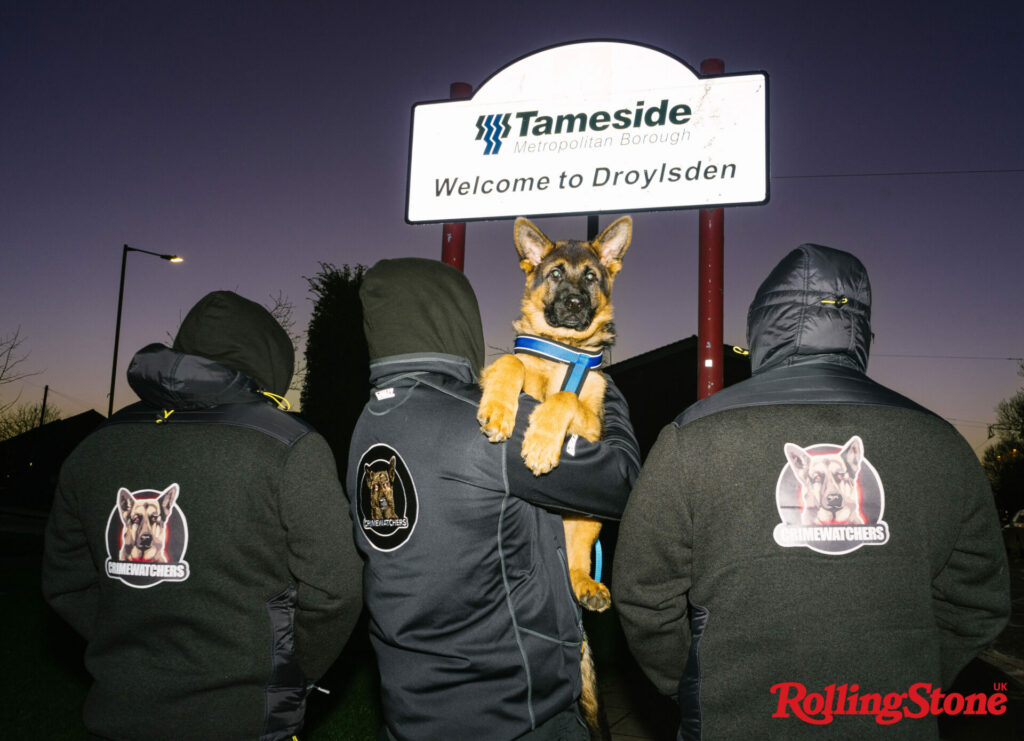
I ask each member to recall a memorable incident from their time with the Crimewatchers. The cocktail bar’s cleaner drags a Henry Hoover around right next to us, forcing the lads to shout over one another as they recall cases involving broken fingers, violent standoffs, and one incident where a man in a balaclava “pulled out a massive knife”. The bouncer puts his cappuccino down and uses his hands to illustrate the size of the knife and the height of the offender. Both were impossibly huge.
They then explain that they patrol the streets of Droylsden and neighbouring Audenshaw from 12am to 5am every night. Afterwards, they post their findings on the Crimewatchers Facebook page before heading back to their day jobs. It sounds like a watered-down Marvel film plot, but without the tights.
They also respond to call-outs. To get in touch, Droylsden and Audenshaw residents either message Crimewatchers on social media or use a designated WhatsApp patrol number. One cry for help came from an elderly lady who rang about her husband, saying, “it’s not a crime, but it’s an emergency.”
“This isn’t only about justice, it’s about community”
“‘Tony fell,’ she said, “‘and he can’t get up. I know he’s not hurt; I just need him to get up,’” the Crimewatchers founder recalls. Remembering this conversation word for word, the founder states that his own father was ill for a short while before he passed away. His personal compassion for the couple’s plight was reflected in the way he and the team carefully lifted the elderly gentleman back onto his feet from the bathroom floor: “We helped him get up, we got him in bed, we got him back safely, and they couldn’t thank us enough for how professional we were.”
Initially reluctant to boast about their other selfless endeavours, the Crimewatchers tell of rebuilding a senior citizen’s garden wall after a drink-driver destroyed it during the early hours. They’ve also recovered a beloved public bench from the Ashton canal, gifted 800 chocolate selection boxes to local children at Christmas, and handed out more than 200 panic alarms to women in the immediate area. They claim that this isn’t only about justice, it’s about community.
“It’s not all about crime, it’s about vulnerable people and being there when it’s needed,” they stress. But this ethos hasn’t always been appreciated by the mainstream media or the local police. The Crimewatchers have previously been criticised for “possibly conducting illegal ‘stop and searches’” and “chasing people from one street to another” by the Greater Manchester Police.
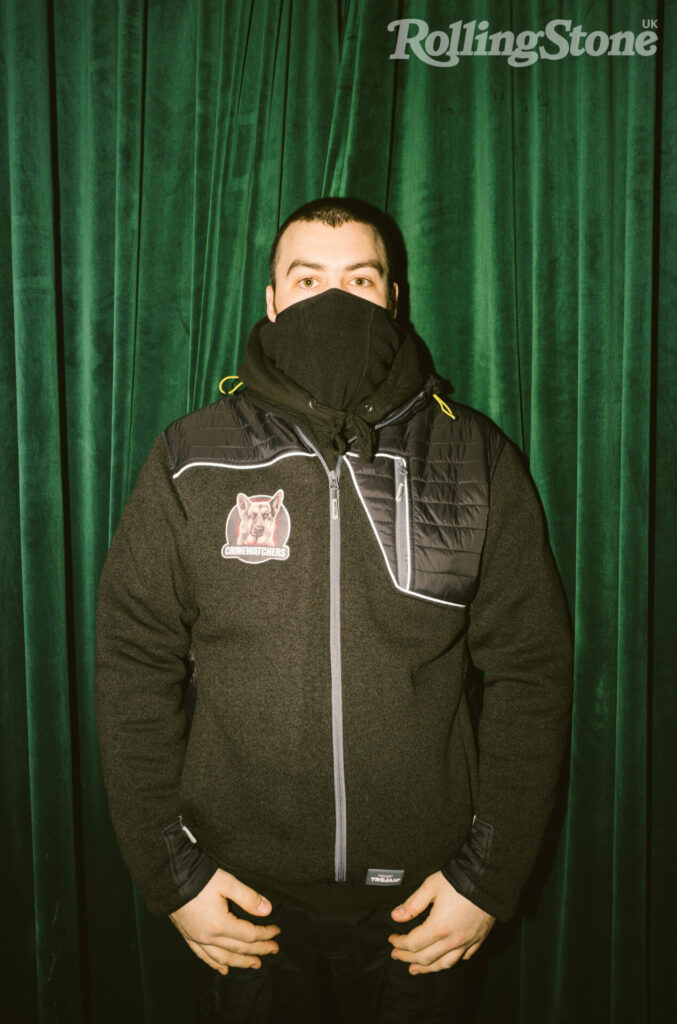
As an outsider, it’s easy to see how the organisation could be deemed an undercover vigilante operation. They answer their patrol phone, mobilise the troops, and prevent crime, taking matters into their own hands in dark uniforms while accompanied by an Alsatian.
However, the group definitively refute this vigilante label as they openly discuss their relationship with the police and the emergency services. Just a few months after criticising them, the police did a U-turn, praising the Crimewatchers as essential “active citizens”. The members recall the night they met with sergeants after stopping two men from breaking into a vehicle on Buxton Lane, Droylsden. The police thanked them and informally offered to help them become special constables and to assist them in getting access to patrol vehicles. When it comes to dealing with the emergency services, one says, “when a lot of people are calling 999 and speaking to the operators, they’re directing them straight to us as they know that they’re probably not going to respond to these small incidents.”
Speaking to Rolling Stone UK, a press officer at GMP confirms that “The Greater Manchester Police and the local authority have spoken to the group before and we support them. They are basically a private security company with insurance.”
“The group definitively refute this vigilante label as they openly discuss their relationship with the police and the emergency services. Just a few months after criticising them, the police did a U-turn, praising the Crimewatchers as essential ‘active citizens’”
Evidence of this collaborative relationship between the emergency services and Crimewatchers can be found in their daily Facebook posts. As recently as 25 March, the group “congratulated the police on a job well done and they thanked us for our help. They then asked us to check on a few residents who were woken up by what was going on.” Instances of the police asking how the dog is and congratulating them on their brave efforts have also been recounted in these posts, suggesting that perhaps the two services are able to operate in harmony.
Tameside’s Chief Inspector of Neighbourhoods, Lee Broadstock, told the Tameside Reporter that the force “will always want to work with active citizens, and as the police, we know we can’t solve all the problems ourselves — we need to work in partnership”. After meeting with the members in person last year, it became clear to Broadstock that both organisations have the same aim. Previous statements which labelled the group as “vigilantes” were retracted by the Chief as he emphasised that “he doesn’t subscribe to the vigilante tag that has been used before”. Instead, he referred to the local lads as “people active in their community who want to work with the police”.
As all Crimewatchers members are aware, the GMP are out dealing with serious crimes and high-priority situations every single day, whereas their role is about checking in on members of the local community and providing peripheral support. They’re a deterrent or the first port of call, and although most people understand this now, the group still receive the odd Facebook comment from a local gossip, accusing them of “wanting to be the police” or “wishing they were the popo”.
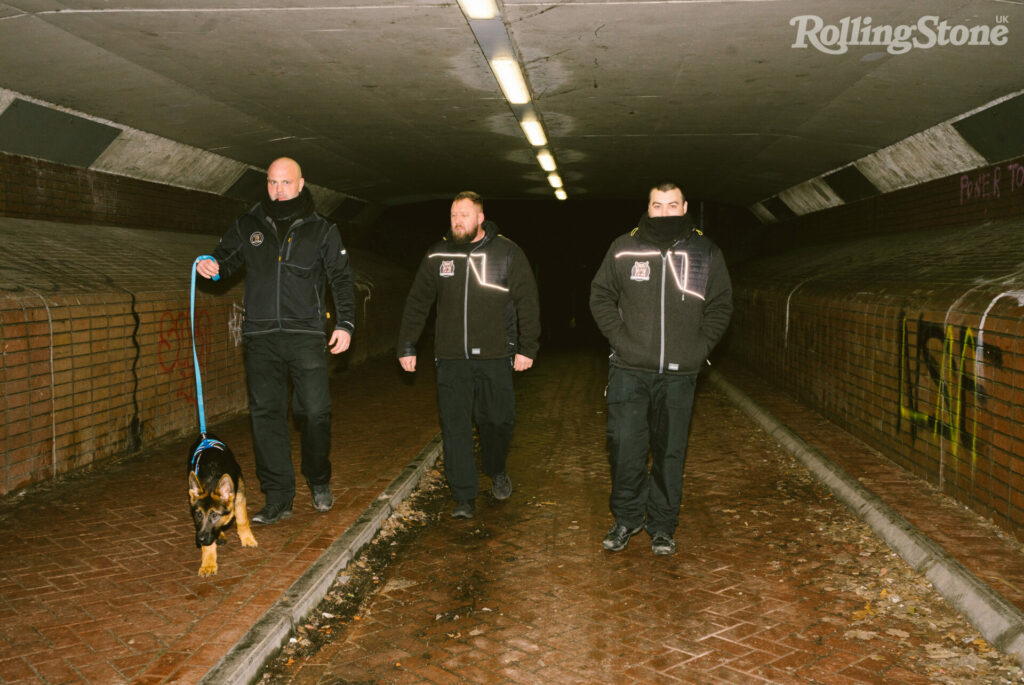
They rely entirely on donations and community fundraisers. “Every month is up and down,” explains the locksmith, an integral Crimewatchers member who offers his services for free to those who have been broken into within the local area.
Droylsden businesses such as The Jam Works, the bar named after the iconic Robertson’s Jam Factory, have hosted several fundraising events and collected donations over the past 18 months. Without this help, the founder explains that they “didn’t have the insurance that we’ve got now, we didn’t have the uniforms, we didn’t have the torches, the equipment, all the walking boots and everything.”
Their goal is simple: to raise enough money to set up a boxing gym for young people. The Crimewatchers want to get the younger generation training in their facilities, so that they will be “focused, and in a completely different mindset”. Occupying the impressionable minds of youths who are currently “going around with their rucksacks on and their BMX’s selling drugs or trying car doors” is seen as a way to tackle crime at its source.
The founder would also love to make enough cash “to be able to reward or pay these guys who are protecting me and others whilst doing so much work in the community”. All members of the Crimewatchers continue to work on a completely voluntary basis.
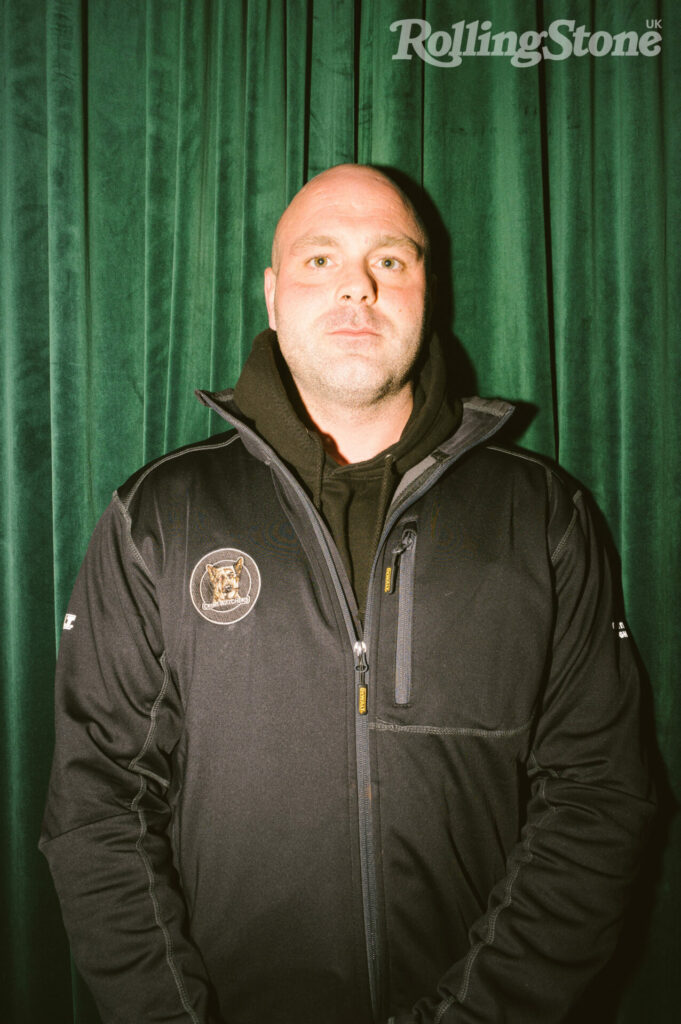
You can’t talk about the Crimewatchers without mentioning Sabre. Known in the community as the founder’s iconic sidekick, Sabre was, his owner and the organisation’s founder says, “a bit of a celebrity”. Laughing about his fame, he jokes that “if we put up a picture of someone who tried to steal a motorbike or something, that’d get about five hundred likes, but post a picture of Sabre in the swimming pool and it’d get twelve hundred.” The rest of the team chuckle at this.
Unfortunately, just before Christmas, they lost Sabre due to old age. In his honour, they want to raise enough money to get a defibrillator installed in Droylsden town centre. Smiling as he holds back tears, the founder explains that a new canine companion, Shadow, is learning the ropes and “already walks like he’s on patrol”.
As we close our conversation, the Crimewatchers emphasise that community lies at the heart of what they do — their actions, their motives and, ultimately, their existence. “From what we’ve learned, it’s obviously the power of the people,” says the founder. “If enough people are behind you, you can achieve anything, honestly.” A final fist bump is passed around the group before the lads cross the main road and split off in different directions. Each is heading home to rest before their next patrol begins in fewer than 12 hours — although for all of them Crimewatchers is a 24-hour occupation.
Taken from the June/July 2022 of Rolling Stone UK. Buy it here.
